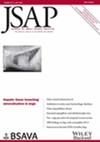Efficacy of probiotic, prebiotic, synbiotic and postbiotic supplementation on gastrointestinal health in cats: systematic review and meta-analysis
Abstract
Objectives
The clinical efficacy of the use of probiotics, prebiotics, synbiotics and postbiotics (biotics) in cats is unknown, despite their use in daily practice. The objectives of the study is to evaluate the effectiveness of biotic supplementation in treating and preventing gastroenteropathies, and in reducing gastrointestinal signs associated with antibiotics in cats.
Materials and Methods
A systematic review was conducted by searching four databases for publications before August 2, 2024, following a pre-registered protocol. Eligible publications were trials involving healthy cats or those with gastroenteropathies, supplemented with biotics (and an inactive control), studying outcomes such as faecal consistency, faecal microbiota or vomiting. Risk of bias and quality of reports were assessed. Effects were synthesised by meta-analyses and vote counting based on direction of effect. Certainty of evidence was rated using GRADE approach.
Results
Twenty reports were included, presenting unclear or low risk of bias. The evidence did not permit a high-confidence evaluation of the effectiveness of biotics, although five of the seven probiotic trials showed beneficial effects on faecal consistency. Synbiotics presented no clinically relevant effect in reducing antibiotics-associated vomiting, with very low certainty, in a meta-analysis including 32 adult cats. Probiotics significantly reduce the Bacillota/Actinomycetota ratio, with low certainty, in a meta-analysis involving 34 healthy young-adult cats. Following vote counting, probiotics improved immune profile in young cats, and increased butyric acid concentration in healthy cats.
Clinical Significance
Current data highlight the need for further research, especially focused on at-risk groups and sick cats, before advocating the use of biotic supplementation.


 求助内容:
求助内容: 应助结果提醒方式:
应助结果提醒方式:


